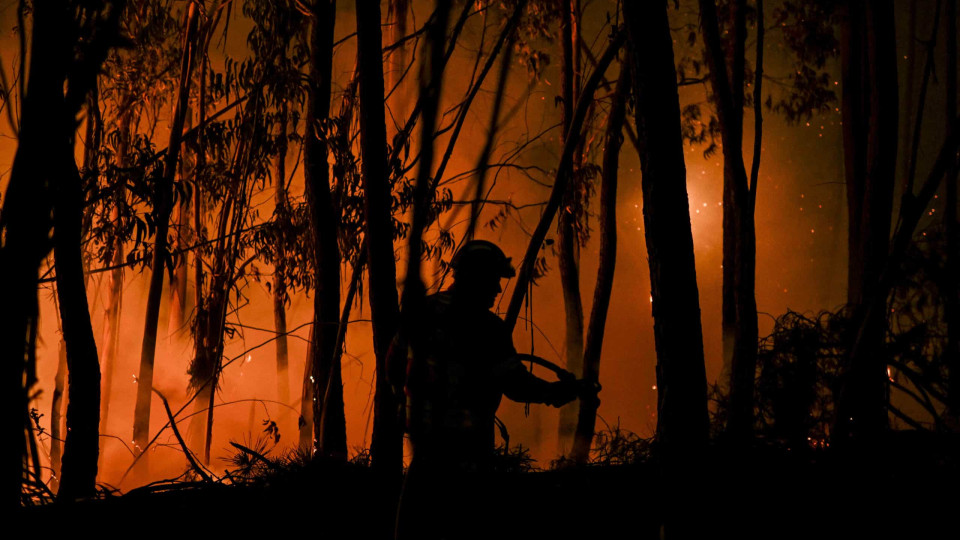Forestry business association says strategy should be rethought
Fuel strip management in forest lands aims to prevent rural fires, but ANEFA -- National Association of Forestry, Agricultural and Environmental Companies questions the annual cleanup and argues that the strategy should be rethought.

© PATRICIA DE MELO MOREIRA/AFP via Getty Images

País Incêndios
"We don't quite understand the need to repeat annually, for the standards that are being demanded, that is, the height of the grass and that type of situation," said the president of ANEFA, Pedro Serra Ramos, in statements to Lusa.
The forestry engineer added that the annual cleanings, for the association, "have an increased concern": in many cases people focus on cleaning the areas where it is mandatory, "but then leave behind the management of the forest areas themselves".
"That is, since the money is not enough for everything, what ends up being noticed is that there is a concern - the little money that there is is used for cleaning, so as not to be subject to a fine -, but then the forest management is left undone, because there is no more money," he explained, admitting that this may not be "so positive from the point of view of prevention" of rural fires.
For the leader, it will be time to "bring the different actors who participate in this back to the table", to discuss "whether it is worth continuing with this strategy", because often the 50-meter strip around a building is cleaned "and then the rest is a disgrace".
According to the most recent annual report of the Integrated Management System for Rural Fires, from 2022 -- the 2023 document will be delivered to the Government soon --, the "global execution of 73,248 hectares was reported (14,210 hectares less than in 2021, a decrease of 17%), not reaching the accumulated value established by the entities".
The document reports, in terms of fuel management, 65,693 hectares (ha) in 2019, 70,387 ha in 2020 and 88,058 ha in 2021.
These numbers do not incorporate, "due to the lack of adequate reporting mechanisms, the majority of private entities (forest and agricultural owners, individual or collective) and municipalities", which have a quite relevant weight, the report states.
In relation to the Institute for Nature Conservation and Forests (ICNF), the decrease was due to the 50% reduction in the area executed using controlled fire and burning (1,829 ha) and a 10% reduction in the area executed in mosaics (14,523 ha), compared to the previous year.
The document also records a slight increase in the execution of the primary network (7,871 ha) and in the protection of areas of high value through 18 pilot projects (1,901 ha).
The 2022 report emphasizes the "increasing urgency of reinforcing measures that stimulate private involvement and the consequent investment in silviculture measures, good management after forest exploitation", among others.
The cleaning of agricultural and forest land, to be completed by April 30, however, suffers from a shortage of labor throughout the country.
"There are areas more affected than others, all companies are suffering a bit from a lack of qualified personnel to do the work," said Pedro Serra Ramos, stressing that companies, as they realized that the situation "will continue", have been investing in mechanization.
The reality is also known by the National Federation of Forest Owners Associations (FNAPF).
"There are already cleaning robots too. There are already other more advanced systems, it has become very mechanized," said the president, Luís Damas, acknowledging that there will always be a dependence on labor, for manual work or specialized workers in the operation of machines.
In areas such as Abrantes, in the district of Santarém, it is still possible to find Portuguese workers, while other companies "already have teams made up of immigrants", in areas such as Viseu or Oliveira do Hospital, where there is a lot of industry.
The leader said that "the coastal regions have some difficulty in finding labor", even because in the interior some jobs can be a complement to local activity.
Pedro Serra Ramos stressed that, "in most cases", immigrants are also "not prepared to carry out these jobs".
"The trend will increasingly be to seek mechanization solutions that, in some way, make up for this lack of labor, because it is different" to be able to "attract young people to work, for example, with robots and deforestation, than to grab a brushcutter and go around cutting weeds", he said.
For Serra Ramos, prevention should be done through the management of forest space, which has not happened, and "the proof is in the level of afforestation", which "is practically zero".
"Owners often do not have the income available to pay for professional forest management and, therefore, it is there that the State should invest much more than in the pure and simple cleaning of small areas, only for protection next to urban spaces," he defended.
Seven years after the tragic fires of 2017, he stressed, "the strategy for professional forest management should have already been outlined", instead of "only focusing on raising people's awareness", and of preparing the future of forest prevention in relation to climate change and rural fires.
"It is time to sit down at the table and do what [...] can be called a sustainability plan for the Portuguese forest," proposed the head of ANEFA, when, more than halfway through the deadline and with only 870,000 trees planted, we are far from the European Union's goal of planting 3 billion trees in the European area.
Also Read: Abrantes extends rural fire fighting devices to 11 parishes (Portuguese version)


Descarregue a nossa App gratuita.
Oitavo ano consecutivo Escolha do Consumidor para Imprensa Online e eleito o produto do ano 2024.
* Estudo da e Netsonda, nov. e dez. 2023 produtodoano- pt.com






